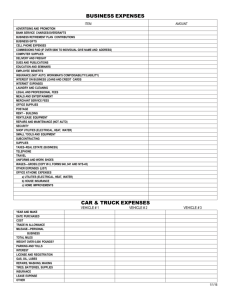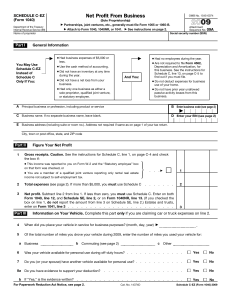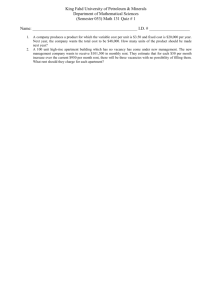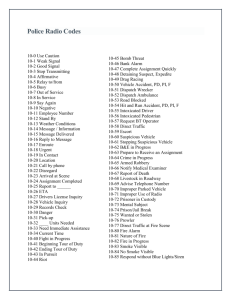Senior Economics/Budget Project
advertisement
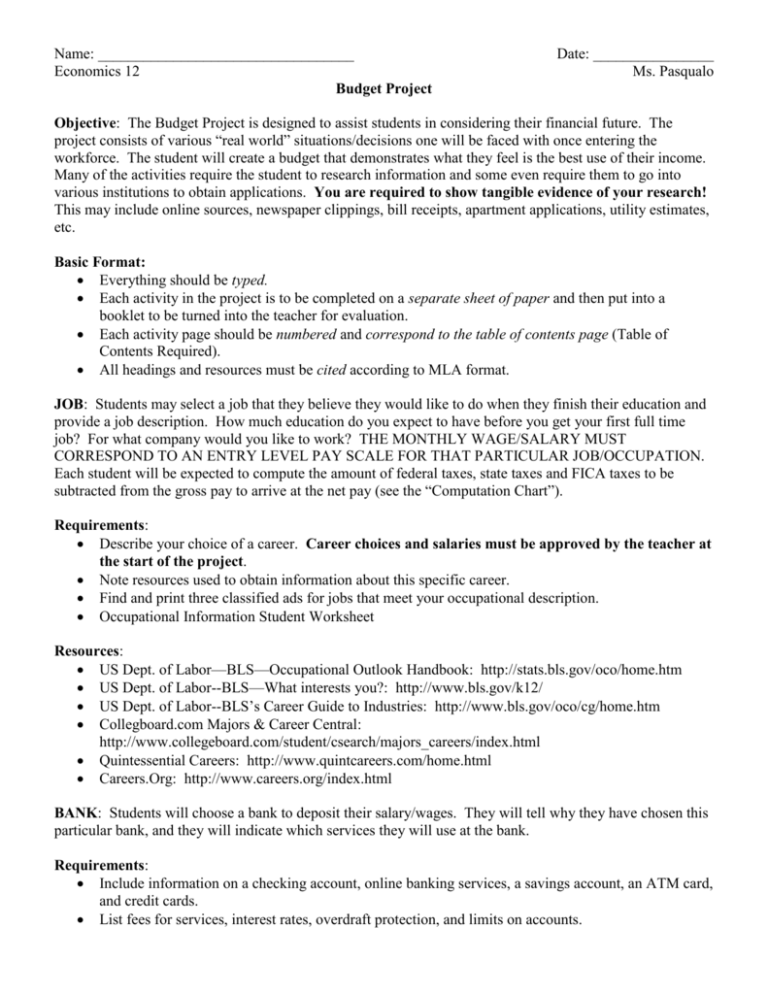
Name: __________________________________ Economics 12 Budget Project Date: ________________ Ms. Pasqualo Objective: The Budget Project is designed to assist students in considering their financial future. The project consists of various “real world” situations/decisions one will be faced with once entering the workforce. The student will create a budget that demonstrates what they feel is the best use of their income. Many of the activities require the student to research information and some even require them to go into various institutions to obtain applications. You are required to show tangible evidence of your research! This may include online sources, newspaper clippings, bill receipts, apartment applications, utility estimates, etc. Basic Format: Everything should be typed. Each activity in the project is to be completed on a separate sheet of paper and then put into a booklet to be turned into the teacher for evaluation. Each activity page should be numbered and correspond to the table of contents page (Table of Contents Required). All headings and resources must be cited according to MLA format. JOB: Students may select a job that they believe they would like to do when they finish their education and provide a job description. How much education do you expect to have before you get your first full time job? For what company would you like to work? THE MONTHLY WAGE/SALARY MUST CORRESPOND TO AN ENTRY LEVEL PAY SCALE FOR THAT PARTICULAR JOB/OCCUPATION. Each student will be expected to compute the amount of federal taxes, state taxes and FICA taxes to be subtracted from the gross pay to arrive at the net pay (see the “Computation Chart”). Requirements: Describe your choice of a career. Career choices and salaries must be approved by the teacher at the start of the project. Note resources used to obtain information about this specific career. Find and print three classified ads for jobs that meet your occupational description. Occupational Information Student Worksheet Resources: US Dept. of Labor—BLS—Occupational Outlook Handbook: http://stats.bls.gov/oco/home.htm US Dept. of Labor--BLS—What interests you?: http://www.bls.gov/k12/ US Dept. of Labor--BLS’s Career Guide to Industries: http://www.bls.gov/oco/cg/home.htm Collegboard.com Majors & Career Central: http://www.collegeboard.com/student/csearch/majors_careers/index.html Quintessential Careers: http://www.quintcareers.com/home.html Careers.Org: http://www.careers.org/index.html BANK: Students will choose a bank to deposit their salary/wages. They will tell why they have chosen this particular bank, and they will indicate which services they will use at the bank. Requirements: Include information on a checking account, online banking services, a savings account, an ATM card, and credit cards. List fees for services, interest rates, overdraft protection, and limits on accounts. HOUSING: Students will find adequate housing by renting an apartment or other housing. You may share an apartment with another person. You cannot be living rent free with family or friends. Requirements: List what services/benefits are included in the rent, the location of the apartment, and other information necessary for housing. Find and print three classified ads for housing. If sharing an apartment with another senior, you must give their name. Your monthly net salary and your yearly gross salary are guidelines in choosing a place to live. Your rent cannot exceed 30% of your salary. TRANSPORTATION: Students will investigate the purchase of a vehicle. They should look into buying or leasing a vehicle. The monthly car payment will be included after it is set by the car dealership or the bank that is financing the loan for the car. Factors to be considered in buying a vehicle would be the current interest rates on car loans, the cost of a certain vehicle, the reliability of a used vs. new vehicle, taxes on the vehicle purchased, and the impact of the monthly payment on their budget. Requirements: Print advertisement for car. Completed sample loan application from a car dealership/financial institution. Information on current interest rates for car loans. Resources: www.autotrader.com www.edmunds.com www.cars.com Specific Car Company Websites INSURANCE: Students will need to secure insurance on the vehicle they purchased. Explain why you chose to go with the insurance company you did. If your vehicle is financed, you cannot use the uninsured motorist fee at DMV. Requirements: Name of the insurance company, coverage listed on the vehicle, and the monthly cost of the policy. CELL PHONE/TELEPHONE: Students will need a cell phone or telephone in the apartment. Every person should make themselves available to be contacted for personal and professional reasons or in case of emergency. The quickest and easiest way to make one available to be contacted is through cell phones/telephones. Requirements: List the company, the monthly costs and particulars including minutes included and other necessary information. UTILITIES: List utilities that the student will be responsible for that are not including in the housing arrangement. These may include, but are not limited to, cable, online services, electricity, trash, water, and others. 2 FOOD and GROCERIES: Consider where your grocery shopping will be done and why. What strategies will you use to make your dollar go further? Also, the student will describe the type of clothing that will be required for their chosen profession. They should also estimate a monthly clothing cost. Requirements: Research at least three resources that give tips on saving money on day-to-day expenses and discuss the tips. Create a monthly food budget using one of the following websites and print the list. Keep in mind that all toiletries must be included. Calculate the costs for dining out, including a gratuity of at least 18%. Resources: www.peapod.com www.freshdirect.com www.netgrocer.com www.target.com ENTERTAINMENT/MISCELLANEOUS: Students should determine what they will do for entertainment and other related expenses and how much it may cost them per month. Explain why activities/hobbies are important and why you chose to spend money on them as opposed to other activities. Are they wise financially? Are you saving for big purchases? Again, what strategies will you use to make your dollar go further? GASOLINE CONSUMPTION: Gasoline consumption is a required expense for most individuals so related expenses must be considered. In addition to considering how much gas will be used, the student should determine which gas station will be used and why. In addition to gas consumption, the student will include estimated maintenance costs associated with their particular vehicle. Remember to consider factors such as age, type, or model of the car when determining the monthly amount to set aside. Requirements: List approximately how many miles will be driven per week. When considering how far to drive to work, refer to the location of the company desired and the location of living arrangements, which have already been determined in Activities 1 and 4. Also, consider visits to the grocery store, visits to friends/relatives, entertainment, etc. List how many miles per gallon you car averages. List estimated maintenance costs and a brief explanation SAVINGS: Students should consider how much money they will set aside per month for savings. Students should realize that they cannot possibly allow for every single expense before they happen. Unexpected expenses could come in the form of car repairs, medical care, or sudden travel. In order to prepare for these future costs (which are a certainty) one should put aside money in a savings account that can be easily accessed. Plan accordingly for these unexpected expenses so that borrowing or charging to cover costs will not be a necessity. Requirements: Identify the current interest rate on personal savings accounts at your bank or whether your employer has a company pension plan or contributes to an IRA for you. Students must allow for both types of savings accounts in their budgets and discuss their financial goals related to these categories. 3 DONATIONS: The student must determine what charitable giving will be a part of their budget. Though many choose not to spend their money on charitable expenses, they can be of some financial benefit. Charitable expenses can be used as tax write-offs on their income taxes. More importantly they remind the student that no matter their profession, they are much better off than many other people their age around the world. Financial contributions may be to a religious institution or to another organization. Students will research what institution they will contribute to, list details about it, and why it was chosen. Remember that donations can be made in the form of time/service. (Be sure to site sources!). BUDGET SHEET: The student will be expected to develop a personal budget that integrates all of the above activities. The student will learn about setting up a personal budget in class, so they may use those skills learned and they may use some Additional Resources provided below. The budget should be placed at the back of the booklet, and IT MUST BALANCE! TAXES: You are required to calculate and pay Federal and State Income Taxes, as well as FICA and Medicare. Resources: https://turbotax.intuit.com/tax-tools/ http://www.bankrate.com http://www.hrblock.com/get-answers/tax-calculators.html HONORS SUPPLEMENT: (select one) 1. The student may think of at least three financial goals they would like to achieve in the future and set up a time-frame for achieving them. Goals will vary by individual, but could be related to education, purchasing a house, car, or some other large expense, or possibly an amount to have once retired. 2. The student may research the concept of a credit score and how to improve it. Be sure to include the impact a credit score has on individual interest rates. 3. The student will choose one of the following websites from below and write a site review. The review must be at least three paragraphs. Remember to include how this website could assist you in future financial decisions. 4 Occupational Information Student Worksheet Career Title: Salary: Educational Training and Requirements: 1. What type of schooling/training (degrees, certifications, apprenticeships, residencies, etc.) is necessary? 2. Are there any other qualifications needed? 3. What does it take to advance in this career? Personal Characteristics and Helpful Attributes: Job Description: 1. What is the nature of the work? 2. What is the work environment like? Occupational Outlook: (Summarize the job outlook and prospects, as well as advantages and disadvantages) 5 Monthly Budget Report Sheet Computing Monthly Net Income Gross Income FICA Amount Medicare Tax Federal Tax State Tax $_____________ $_____________ $_____________ $_____________ $_____________ Net Income $_____________ Monthly Expenditures Rent $______________ Vehicle Cost Per Month $______________ Monthly Vehicle Insurance Payment $______________ Monthly Food Costs $______________ Monthly Phone/Cell Phone Cost $______________ Utilities Monthly Cost (total from below $______________ Cable/Internet $ _____________ Electric/Gas $______________ Water $______________ Other $______________ Monthly Clothing Costs $______________ Entertainment Costs $______________ Monthly Gasoline/Maintenance Costs $______________ Savings Deposits $______________ Contributions/Monthly Donations $______________ Total Monthly Expenditures $______________ Monthly Net (bring home) Income $______________ Monthly Surplus or Deficit + or - $______________ 6



